| Bespoke model made by my friend, for his friend |
Let me first define what bespoke means. By definition from a dictionary, in what would be termed as ‘old speak,’ it would mean ‘spoken for.’ As in, a garment that is spoken for by someone, is owned and was created specifically for them and no one else. It will fit them perfectly (at least in theory) and should not fit anyone else in that same manner as we are all shaped differently.
Now that we have the definition out of the way, we can begin to talk about what it means to go bespoke, whether or not it is better than RTW or MTO and whether or not it is worth it’s price. First off, you will have to bear in mind that I have made bespoke shoes, I own several pairs of them and wear them regularly, so in a sense, I am somewhat bias on the subject at hand, but will try to be as objective as I can be. And to also make a point of clarification, let’s say that bespoke is strictly going to be something that was made by hand, not by machine, as I believe that this coincides with the true definition of what it means to be a bespoke product (at least in terms of shoes and suits…).
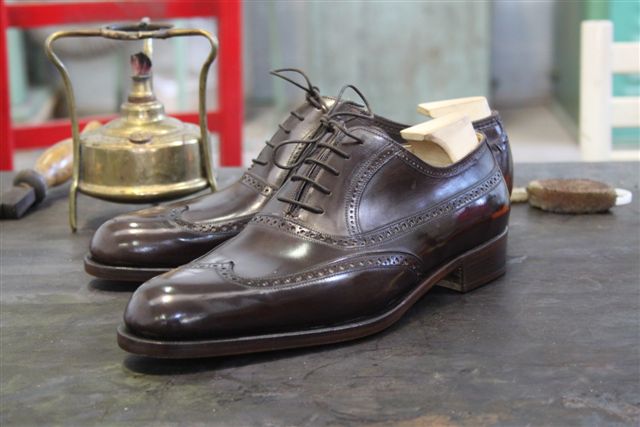 |
| Riccardo Bestetti bespoke model |
Is it worth it?
To answer this question will very much depend upon you, the person who is in prospect of buying them. You will have to ask yourself several questions:
1. Do I have messed up feet that cause me pain?
2. Is it extremely hard to fit my foot into a ready to wear shoe?
3. Can I afford it without blinking an eye?
4. Do I care about what goes on my feet?
You will usually find that the common consensus is as follows: If your feet are fairly straight forward (i.e. they are normal and can fit very comfortably into most RTW shoes, then you truly do not NEED a bespoke shoe. Now this has nothing to do with wanting one but simply the fact that if you have good feet then you do not fall under the category of people that get bespoke for health purposes. Because of this, being worth it or not will be entirely up to how you perceive the importance of fit, design, and the ultimate in superior quality. I cannot answer this for you, but can tell you that the bespoke shoes that I own, fit me better than the rest of the shoes that I own, and because of that are therefore more comfortable. But then again, I do have a slight problematic foot that is relatively flat, narrow and very low volume, which makes it hard to fit into RTW shoes that don’t have narrow widths.�
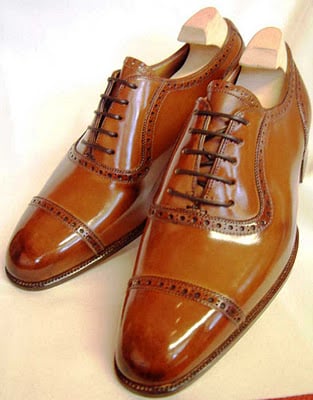 |
| Gaziano & Girling bespoke shoe |
Why is it so much more expensive (and time consuming)?
People often seem incapable of fathoming the concept of paying upwards of $3000 for a pair of shoes, yet will happily pay that and even more on a suit….I have never understood this, but will hopefully be able to explain to you why the prices are as so. First off, you have to understand that it is rare that a bespoke maker is able to do the entire process all by himself/herself. You will find that many jobs these days (like closing) are outsourced. And more times than not you don’t have all of these people under one roof, so therefore time constraints start to take place as the shoemaker finds themselves waiting for others.
The process is as such:
1. The last maker (and/or pattern maker) comes to measure your foot. At that same time you decide what� shoe you would like to have (i.e. design) and look at the coloring, leather, materials etc. that you like. If you choose something unique, you are creating more work for the pattern maker who will have to cut a new and unique piece of work.
2. They then take those measurements to create a precise mold of your foot, what is called a ‘last’
3. After that, the pattern maker will design your pattern by way of the last. That means he uses your specific last to then create your specific pattern. If this design is something unique to you, the pattern maker might take extra long to get it right.
4. After the pattern is cut, they then cut out the leather and give it to the closer to sew all together. This part is usually outsourced so therefore they need to wait on them to complete it.
5. Once the upper is sewn together, they will attach it temporarily to the last to create a trial-fit shoe for you, to make sure that the last fits the way that you would like it to. This process involves you coming back or them coming to you, which increases the total amount of time for the process.
6. Once you have sorted this out (assuming there are no adjustments to be made), you then have to have the shoe ‘made,’ by the maker (this is the bit that I learned, and as you can see is just one part of the entire process).
Let’s just assume that before taxes a bespoke shoe costs �2500 (which is close to the average out here in England). Now let’s assume that at best, the shoemakers (owners of the company) take �1000 profit out of that, after all expenses. Now let’s just assume that it’s a two man firm and they can make 100 pairs a year (which is a very good number in bespoke shoe terms). That equates to �100,000 a year, but divided by 2, coming to a total of �50,000/year for each person. Now, this is all best case scenario, so let’s just say that this is a good year for a pair of bespoke shoemakers. So, considering the amount of work put into a year’s worth of doing this, it’s not all that glorified in terms of making A LOT of money, is it? So, when you ask yourself why a bespoke shoe cost so much, you will see that a lot of work goes into it, a lot of hands touch it and there is not as much profit as you may think….it’s far more for the love of making quality shoes then it is for the ambition of becoming rich!
Shoes Below: George Cleverley “Churchill” model, one bespoke, one RTW, can you tell which one?
(Pictures Courtesy Of: Leather Soul)
Can you tell the difference?
Okay, well let’s now assume that you don’t have problem feet and that money is not an issue. Do you still go for bespoke? Well, I certainly would and the reasons are because, for one, I am a shoe freak. Not only do I want a shoe that no one else has, a shoe that is unique to me, my taste and compliments my wardrobe perfectly but also a shoe that stands out as being made from the best materials around. You instantly see this when you see a bespoke shoe. It’s not like you can spot them a mile away on someone’s feet but when up close and personal with one, the distinct qualities that make it bespoke are evident and to me speak wonders about the shoe and the person, i.e. someone who appreciates fine footwear. And maybe I am bias saying this because I have spent so much time around both bespoke and RTW shoes, but not only can you tell the difference aesthetically but also in terms of psychologically, as I believe that wearing something that is made for one’s self provides a feeling of pride and happiness, much stronger than any RTW shoe can give you….but hey, that’s just my opinion! You will have to decide this for yourself…
Shoes Below: Gaziano & Girling (one bespoke & one RTW)

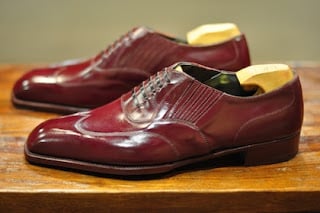
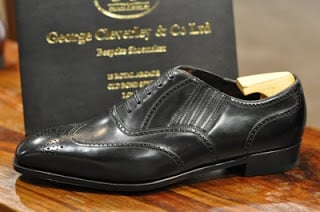

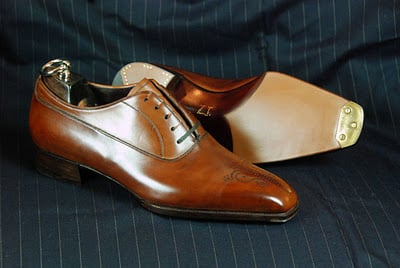


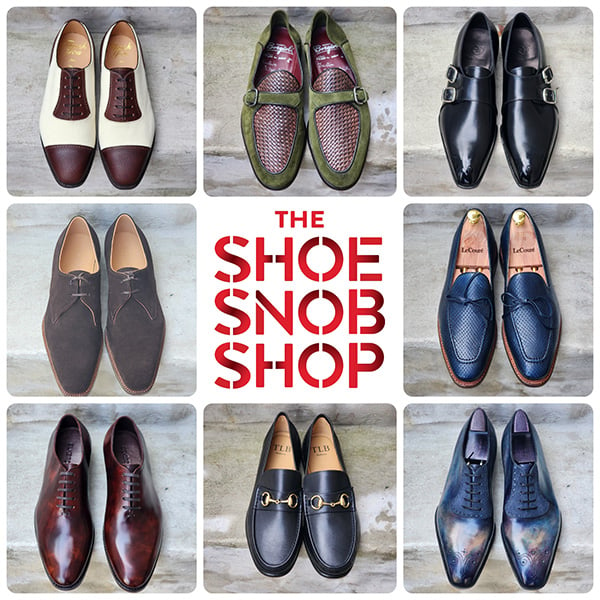
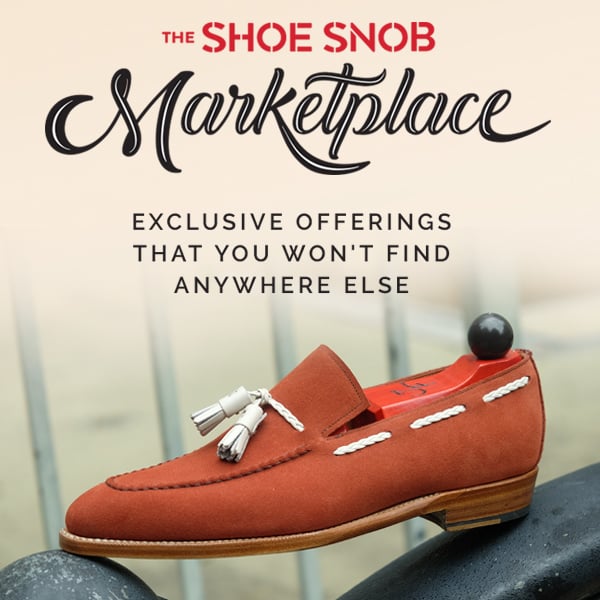
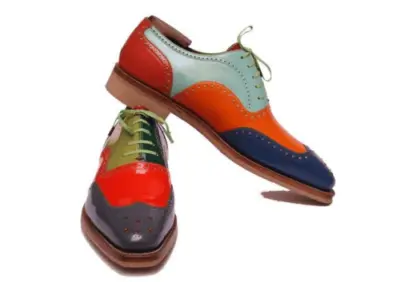
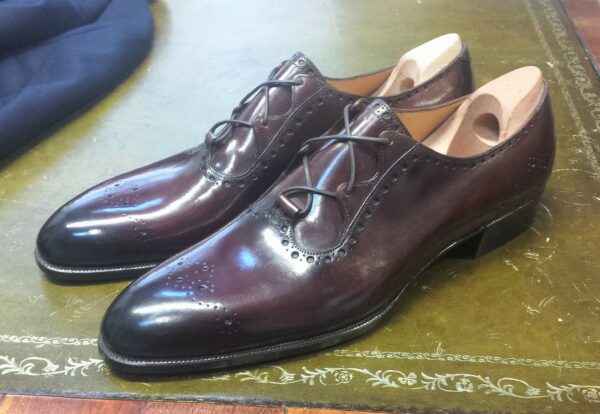
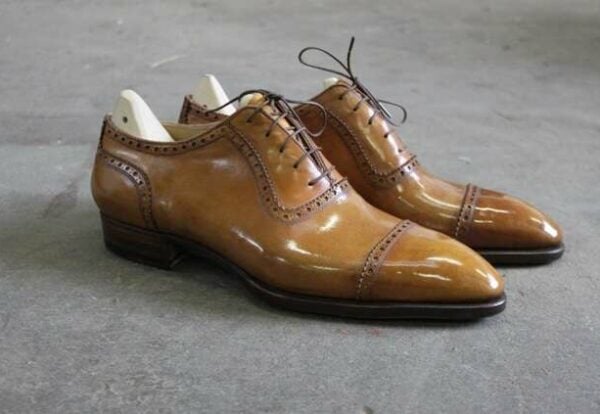
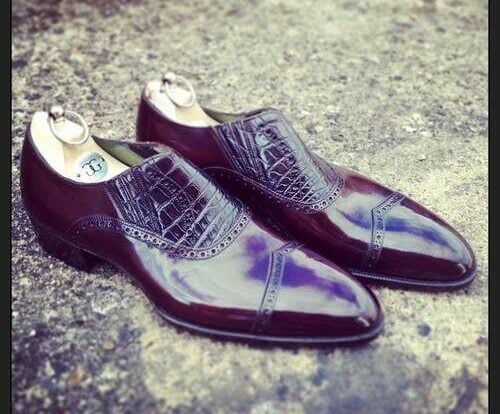
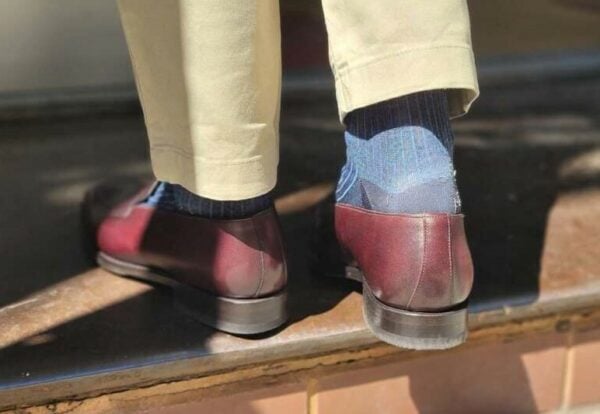
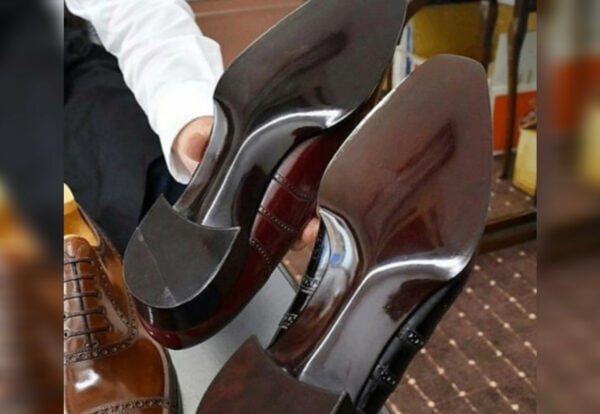
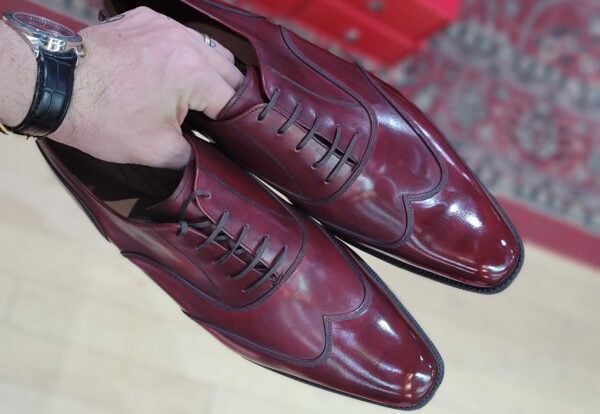
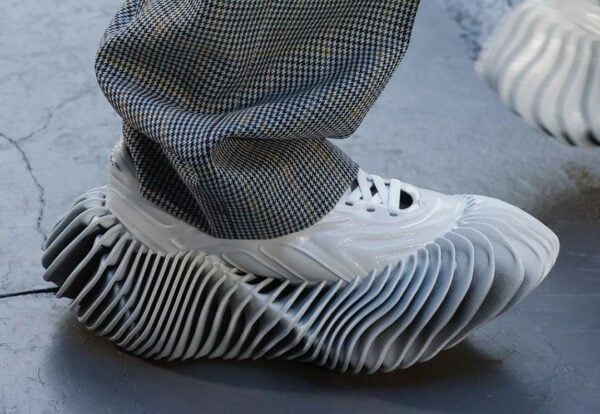
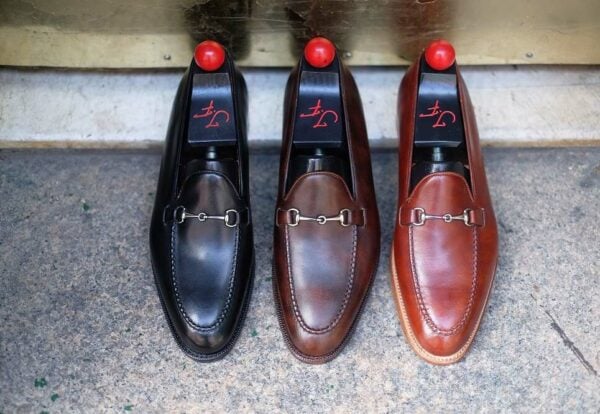
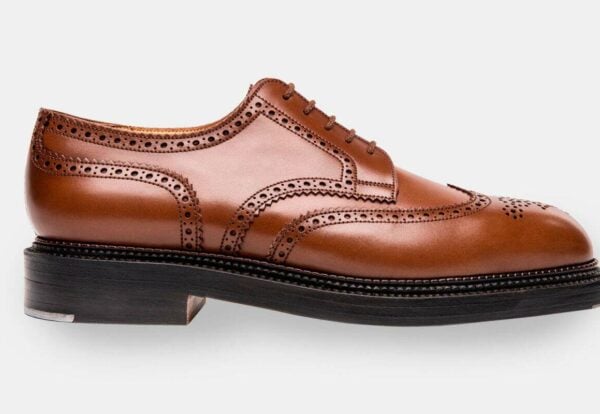
Justin,
Very interesting article indeed. You hit the nail on the head in regards to bespoke shoes making.
If one has been near bespoke shoes, you can tell, as said not from a mile away.
Your query, can one tell? Yes, top GC is bespoke, whilst the black shoe is RTW/MTO.
For the GG’s, top shoe is RTW and bottom shoe is bespoke.
Hope my assumption is correct, judging from the depicted pictures.
Thanks for a very well written article.
Regards
Richard
Great article Justin and thank you for clarifying that this post is about bespoke handsewn. I’ve seen too much use of the term bespoke to mean manufactured or even ‘hand made’ bespoke. As you know they’re not the same product at all!
Bespoke handsewn does indeed mean a great many hours of work, years of training, years of practice, quality of leathers, specialist craftsmen etc. and these do indeed make up the majority of the costs. So yes, the profit margins are tiny.
But bespoke manufactured shoes, particularly branded shoes, do not involve these elements, the expertise/costs are minimal and the profit margins are significantly higher.
So all that I would add is, don’t expect to pay less than �2500 for the finest bespoke handsewn shoes made in in England (choosing your shoemaker is really down to taste and style) and don’t pay more than �1000 for a pair of manufactured bespoke shoes – it’s just not worth it!
Love the post Justin. I would just add that handsewn bespoke shoes will last you a lot longer than a R2W pair (20 years or more) because the upper leather is such good quality and they are repairable almost indefinitely. So, year for year, they are good value. I suppose it’s a question of disposable cash.
One other thing, as we age, our feet can start to give us problems, so bespoke shoes score on the health front in this respect
in vienna you can have bespoke shoes for less. how do they do that?
Richard – Glad that you enjoyed the article. And yes you were dead on with the guessing of which shoes were which. Thanks for commenting!
Madame Shoe – Thanks for the input!
Jimmy Shoe – Well said, thank you!
Anon – Well, here comes a can of worms….First and foremost, let’s take Vienna out of the equation and just talk about bespoke shoes in ‘other countries’ that are significantly cheaper. The top reason being is that the cost of labor will be a lot less with respect to England vs other countries. Other reasons being that there are ways to cheat when doing bespoke shoes, like stitching a sole 8 stitches to the inch and then finishing with a 12 to the inch fudge wheel that makes it look like you did more work than you actually did, but ended saving you a boat load of time (and therefore costs). This is just one way that I will tell you about. Another thing that i once had the dissatisfaction of hearing is that one bespoke maker would take on “apprentices” and make them work free, while they made the shoes for paying clients. This was complete exploitation, that allowed the maker to charge less than his competitors. Apprentices usually will make shoes for themselves or others (that don’t pay) until they are ready to make for clients and will then start being full-on makers and getting paid. So, you can see that there are ways to get around high costs, but predominantly, the cost of labor makes up a big chunk of this…
-Justin
thanks for clarification.
How does bespoke pricing tend to work with the reputable UK makers? Are follow-on orders any cheaper after the first commission (to reflect the fact that the last has already been created) or do most of the makers tend to try and keep it simple and keep the same pricing for subsequent commissions?
Anon – This varies really. Some offer a consistent pricing, like G&G, where the first will be the same as the last, where as other, like Carreducker, charge a premium for the last on the first order and then subsequent ones will be cheaper. So, it just depends really….
-Justin
I am considering bespoke shoes, yet I still have a hard time understanding why shoemakers charge so much. Very fine RTW shoes which cost between 1,000-1,300 euros (Lobb, St Crepin, Edward Green…) are already almost entirely welted by hand. Let’s assume creating a last costs 1,000 euros. Apart from a special design request, I don’t see how cutting the leather and welting the shoe can justify a final price of 3,000+ euros. And since the last is made, subsequent orders should be approximately the price of RTW, right? Therefore I tend to think bespoke may be a high-margin business.
After further research it appears that bespoke shoes are entirely hand made while RTW are only partially hand made – even at the highest price points. Certain construction types are almost exclusively reserved to bespoke, like a beveled waist with fiddleback. Only the finest material are selected. This translates into higher man hours and therefore higher costs. Another factor can be that prices are artificially inflated to convey a prestige status and cater to a certain crowd.
I like your first sentence but not your last. There aren’t any other factors besides time=money. Keep in mind there are fitting stages as well when you go bespoke, and that might result in modifications to the last by the lastmaker. Patterns for RTW are established, but not for bespoke. The pattern will be made after the lastmaker passes that on to the cutter.
They’re not just hand made, they are custom made for your feet. The shoemaker makes wooden models of your feet and uses those models (lasts) to make shoes that fit the unique shape of your foot.
Hi Justin. Just came across your blog and am really enjoying it. I have a couple questions. 1) I have had bespoke shoes made in Hong Kong and Dubai. Both of them were fairly pricey, but much less expensive than I could have had made here in the States, and I am happy with both. Obviously the cost of production is much less in those locations, but do you know if there are significant differences in quality? (I wouldn’t know) 2) How can one visually tell if shoes are bespoke? I used to have my shoes shined by a guy who once had a shop in Greece, and the first time I went to him, he asked, “Where did you have your shoes made?” He obviously had the experience to know, but what are the tell-tale signs? I can easily tell a bespoke suit, but don’t have a clue when it comes to shoes.
it would appear that your husband needs at least bespoke at the very minimum let alone a trip to the podiatrist….I am not a doctor so can’t recommend much outside of seeing a foot specialist asap
Can somone yet tell me why a bespoke shoe cost more than 500 ++ USD, a friend of mine has a different feet, and when I found out and spoke to him, he told me all bespoke shoes cost more than 500 ++USD, which is premium luxury, while he is looking for something which is affordable luxury and can do justice with his feet and wallet as well, can you recommend me with few bespoke shoe maker below 500 USD?
Hi Anamta, if you’re looking for bespoke shoes in Dubai, you can get a pair made at Italian Shoe Factory. I think you can book an appointment on their website italianshoefactory.com!